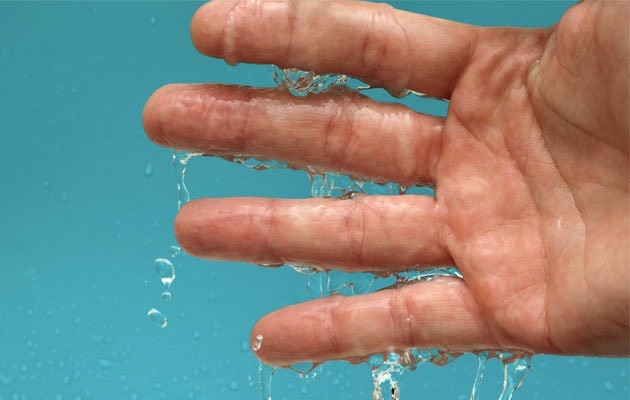Dermatology Tips and Treatments for Hyperhydrosis of Hands: Innovative Solutions
Dermatology Tips and Treatments for Hyperhydrosis of Hands: Innovative Solutions
Blog Article
Comprehending the Root Causes of Excessive Sweating and Its Impact on Life
Too much sweating, likewise known as hyperhidrosis, is a problem that influences a substantial part of the population, yet its underlying reasons and ramifications on day-to-day working stay somewhat enigmatic. While it is frequently recognized as a physiological action to regulate body temperature level, the triggers for excessive sweating can differ widely among people, incorporating not just physical aspects however also emotional and mental components. The influence of this problem expands past plain pain, usually influencing social communications and overall quality of life. By delving into the root creates of hyperhidrosis and discovering its complex effects, a much deeper understanding of this prevalent concern can be gotten, clarifying the complexities that individuals grappling with excessive sweating browse daily.
Physiology of Sweat Glands
The regulation of sweat manufacturing, an essential physiological process, is mainly controlled by the task of sweat glands distributed throughout the human body. Gland are categorized into 2 primary types: eccrine and apocrine glands. Eccrine glands are one of the most countless and are located in nearly all locations of the body. They play an essential role in thermoregulation by producing a watery fluid onto the skin's surface area, which vaporizes and aids cool the body down. In contrast, apocrine glands are focused in locations abundant in hair roots, such as the underarms and groin, and their secretions are thicker and milklike in look.
When the body temperature rises, either because of exercise, high temperatures, or psychological stress and anxiety, the nerves causes the gland to create sweat. This sweat is made up largely of water and electrolytes like salt and chloride. The procedure of sweat manufacturing is necessary for preserving the body's inner temperature within a slim, ideal range, highlighting the crucial role gland play in human physiology.
Triggers for Excessive Sweating
In understanding the origin of excessive sweating, it is vital to recognize the triggers that can lead to this physiological action. Excessive sweating, additionally understood as hyperhidrosis, can be triggered by numerous elements, both physiological and environmental. One typical trigger is psychological stress or anxiousness, which can stimulate the body's gland to generate even more sweat than is essential for cooling down. Physical physical effort, heats, and spicy foods are additionally recognized to activate extreme sweating in individuals prone to this problem. Specific medical problems like hyperthyroidism, diabetes mellitus, or menopause can add to excessive sweating as well.
In addition, medicines such as some antidepressants, opioids, and certain supplements can additionally serve as triggers for hyperhidrosis. Recognizing these triggers is necessary in taking care of too much sweating effectively - How to stop sweaty hands. By recognizing and resolving the specific triggers that trigger excessive sweating in a private, healthcare providers can establish personalized treatment strategies to minimize this condition and boost the individual's lifestyle
Medical Issue Associated
Connected with extreme sweating are different medical problems that can worsen this physical action. One common condition is hyperhidrosis, a condition identified by abnormally raised sweating that exceeds the body's thermoregulatory needs. This can manifest in focal locations like the palms, soles, underarms, or face, impacting an individual's top quality of life because of social embarrassment and discomfort.
In addition, my response endocrine conditions such as hyperthyroidism, diabetes mellitus, and menopausal warm flashes can also result in excessive sweating. Hyperthyroidism causes an overproduction of thyroid hormonal agents, increasing metabolic process and setting off sweating. Diabetes can cause sweating episodes, particularly throughout hypoglycemic episodes when blood glucose levels drop too low. Menopausal warm flashes, attributed to hormone fluctuations throughout menopause, can cause abrupt and intense sweating, typically come with by flushing and heart palpitations.
Furthermore, infections like consumption, endocarditis, and hiv have been related to evening sweats, an usual sign known to disrupt sleep and affect overall well-being. These clinical problems highlight the diverse array of underlying factors that can add to too much sweating, requiring extensive analysis and administration by medical care experts.
Psychological and Emotional Elements
:max_bytes(150000):strip_icc()/sweaty-palms-palmar-hyperhidrosis-4691320-10512b2d428846059753b76df6dc74c2.png)
Effect on Social Interactions
Too much sweating can have extensive results on an individual's capacity to involve pleasantly in social communications. The noticeable indicators of sweat spots or wet spots on clothes can bring about embarrassment and self-consciousness, triggering people to take out from social circumstances. This withdrawal can impact connections, limit social tasks, and impede individual and expert development.

In addition, the anxiety and self-esteem problems stemming from too much sweating can impact communication and social skills. Individuals may have a hard time to focus on conversations, he has a good point take part in team tasks, or reveal themselves with confidence. This can cause feelings of seclusion and solitude, as social connections end up being challenging to maintain.
Verdict

While it is generally comprehended as a physiological response to regulate body temperature level, the triggers for extreme sweating can vary commonly among individuals, encompassing not just physical elements however additionally psychological and emotional aspects. By diving into the root creates of hyperhidrosis and exploring its diverse impacts, a deeper understanding of this pervasive issue can be gained, dropping light on the intricacies that individuals grappling with excessive sweating navigate on a day-to-day basis.
Physical exertion, high temperature levels, and spicy foods are likewise known to activate extreme sweating in individuals susceptible to this condition. By identifying and addressing the details triggers that motivate excessive sweating in a private, medical care carriers can establish tailored therapy strategies to relieve this condition and boost the individual's top quality of life.
Too much sweating can have profound results on a person's capacity to involve easily in social communications.
Report this page